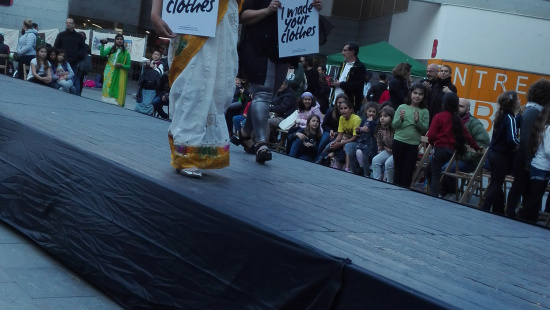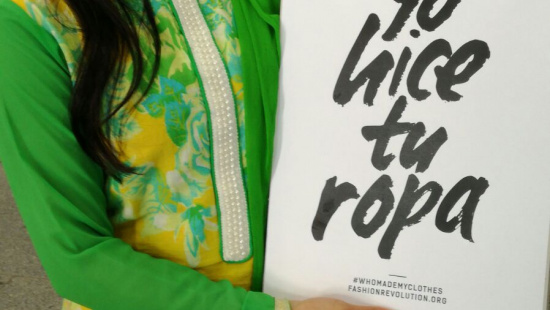The Fort Pienc shopping hub wants to get the whole neighbourhood involved in the “Let’s turn fashion upside down” project
When
16/03/2018
- The project by Upcycling Barcelona and the Fort Pienc shopping hub is the winner of the March 8 Maria Aurèlia Capmany Prize, whose focus this year was “Undressing gender: the aesthetics and cultural representation of gender.”
“Let’s turn fashion upside down: I like it, I like myself, I decide” is the slogan of the Fort Pienc shopping hub project and the association Upcycling Barcelona that recently won the 17th March 8 PrizeMaria Aurèlia Capmany, swooping up the prize money of 15,000 euros. With this initiative, the Fort Pienc shopping hub, with collaboration from entities in the neighbourhood, will promote a sustainable fashion project that stands up against stereotypes around gender, age and origin and seeks to turn the concept of aesthetics on its head.
Along with undermining stereotypes and prejudices that perpetuate inequalities – mainly among women – the traders want to raise awareness of our ecological footprint; encourage responsible consumerism that doesn’t let recyclable products go to waste; and promote new alternative fashion trends, that are already on the up, based on reuse.
For a year now, retailers in Fort Pienc and the Upcycling association have been spearheading an awareness-raising campaign in the neighbourhood. As the ethos of the shopping hub is to get as many entities and associations from the neighbourhood involved in all its activities, it got to work and secured support from Fort Pienc Civic and Cultural Centre and the Fort Pienc libraries and Arús. These actions sowed the seed of the winning initiative for this year’s March 8 Prize.
The shopping hub’s social DNA
“The social aspect of the activities the shopping hub organises is very important; it is part of our DNA,” highlight the president and secretary of the shopping hub, Juanjo Peña and Marcos Peña, respectively. After the satisfaction of receiving the prize for their project ideas, they are already working on organising the activities that will be held throughout the week of April 16 to 20, with this last date being key as it commemorates Fashion Revolution Day. This international event is to remember what happened in 2013 when the Rana Plaza building collapsed in Bangladesh, where several textile factories that made products for international chains were located. This tragedy caused the death of 1,138 people.
Participation from entities in the Fort Pienc shopping hub initiatives has a long history. There are collaborations from ACCEM – an NGO that provides support and assistance to people at risk of social exclusion and develops actions to improve quality of life for refugees – or Mescladís – a solidarity economy initiative that works to create opportunities for people with difficulties accessing the job market. With “Let’s turn fashion upside down”, the traders are hoping to increase collaboration and participation from entities and associations in the neighbourhood, along with schools. It is worth mentioning that Fort Pienc shopping hub is made up of more than a hundred members (of which 31% are of Asian origin) as well as the stallholders at the Encants Market.
The main idea of the “Let’s turn fashion upside down. I like it, I like myself, I decide” project is to organise an alternative fashion week that helps people rethink the established canons and demonstrates sustainable fashion best practices that are more equal when it comes to gender, age, sexual orientation and origin. The goal is to show people that an alternative fashion does exist, with something for everyone and that we can all express beauty in our own way. This is where the Upcycling association comes in. This association promotes creativity with old clothes and aims to break away from fashion stereotypes by, for example, creating items of clothing that are different from the ones in the shops.
The main activities during the week of April 16 to 20
- Big sustainable fashion parade with designs using recycled materials that are “genderfluid” (a style that shies away from clothes made with sexist segregation in mind), created by the professionals at Upcycling fashion and students from local design and pattern-making schools.
- Parade of traditional dress from some of the countries where big industry bases its textile production. The aim is to raise awareness of the human and environmental impact of fashion. Entities representing different Asian communities in Barcelona will be participating. The models will be real people: tall and short, plus sizes and small sizes, boys and girls, transsexuals, young people and not so young people.
- Textile handicrafts market in Plaça de Fort Pienc: there will be a display of social and solidarity economy textile production, as well as items by designers who use textile handicrafts as a means of artistic expression and political complaint.
- Round-table on the psychology of fashion aimed at the two secondary schools in Fort Pienc: Fort Pius and Ramon Llull.
Clothes recycling workshop with cut-out patterns for primary-aged children with participation from the AMPAs (Parents’ Associations) at both the neighbourhood’s municipal-run schools. This fun workshop will be led by the designers from the Upcycling association. The goal is to encourage reflection on sexual segregation and stereotypes in children’s clothing. There will also be a doll exhibition in the entrance hall of the Civic Centre.




